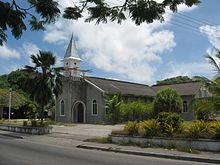
The Nauru Congregational Church (NCC) is the largest religious denomination in Nauru, claiming as members approximately 60% of Nauru's population of about 10,000. [1] [2] [3]
In the 2011 census, it was noted that those affiliating to the NCC made up 35.7% of the island's population, 3,552 out of 9,945 people. [4] In the following census, 10 years later in 2021, 4,001 people, out of a population of 11,680 people (34.3%) claimed affiliation with the NCC. This was followed very closely by the Roman Catholic Church with 3,959 (33.9%). [4]
The NCC is a Protestant Congregationalist denomination. It has seven congregations in Nauru. [1] Each of the congregations is headed by a deacon. Rene Harris, a former president of Nauru, has served as the general secretary of the church. [1]
In 2015, Pastor Wanda Joleen Hiram and Pastor Ruth Omodien Garabwan became the first women to be ordained as ministers in the NCC. [5]